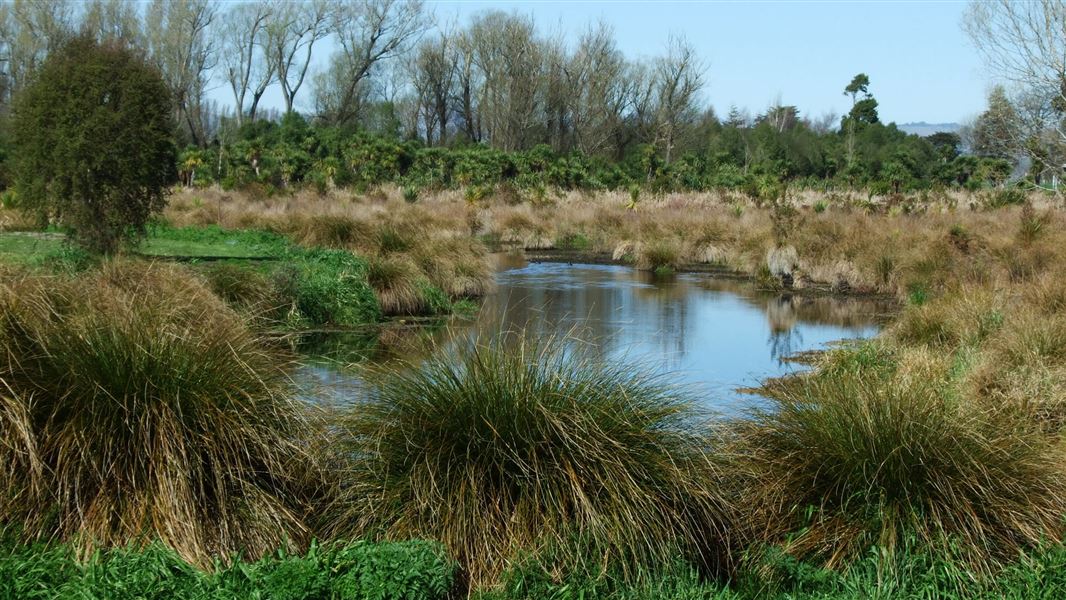Explore the wetland on the boardwalk and tracks that meander through tall raupō, flaxes and grasses, and beside pools.
The Ōtukaikino Reserve is in the north of Christchurch, at the southern end of the northern motorway.
The entrance is off the Main North Road, between Chaneys Corner and the Belfast end of the motorway.
Car park closed from 6 pm
The gate to the reserve is closed each night from 6 pm. The site is still open, but visitors after hours will need to park on the roadside, and use the pedestrian assess around the gate.
Cultural considerations
Eat food within the grassed area by the car park where there is plenty of room for picnicking. Do not eat within the memorial site.
Remember
- As this is a wildlife area, no dogs, even on leashes, are allowed.
- Remain on the marked track at all times.
- Dress for the weather.
- As the walk crosses ponds and a stream young children must be supervised at all times.
- The gates of the reserve close at 6 pm.
Note
- Use the loop track only - the boardwalk is closed to the public.
- The loop track is not suitable for wheelchairs.
- A public toilet is available near the grassed area. These are suitable for wheelchairs.
- No drinking or washing water is provided on site.
- Take your rubbish away.
Contact
The Lamb and Hayward, Reserve Development Ranger, Matthew Brosanhan can be contacted by phone +64 27 464 8556 or email matthew@otukaikino.co.nz
Ōtūkaikino is a freshwater wetland, a remnant of an area of former swamp that dominated the Christchurch landscape in the mid 19th century.
A wetland is described as a plant community adapted to growing in situations where the freshwater table is close to or above the surface.
A living memorial
Over the years most of the original native vegetation around the wetland disappeared. But, since 1992 the area has been gradually restored and is managed as a “Living Memorial”. This has been achieved through a unique partnership between the Department of Conservation and Lamb and Hayward Ltd. (funeral directors), supported by Te Ngāi Tūāhuriri Rūnanga.
The concept is to plant a New Zealand native tree to commemorate the passing of a loved one. It is summed up in its Māori title - Mau Mahara - remembering you.
For each funeral they conduct, Lamb and Hayward donates funds to the Department of Conservation for trees to be planted and cared for.
There are no burials within this reserve, and specific trees are not dedicated to any one person.
Each year families and friends are invited to attend an interdenominational memorial service on site. All the plantings of the past year are dedicated as memorials to those who have died over the year.
Plants and wildlife
Some native species such as raupō, toetoe, tall tussock sedges (pukio), blechnum fern (kiokio), cabbage trees (tī kōuka), kōhūhū and karamū, managed to survive in the reserve. Others are being restored back such as kahikatea, kānuka, tōtara, mataī, ribbonwood (mānatu) and lancewood (horoeka).
All new plants are genetically sourced from the original native plants in the reserve or, where the species has disappeared, from the closest original sources.
Pukeko, shoveller (kuruwhengu), grey teal (tētē), marsh crake (koitareke) and even a bittern (matuku-hūrepo) have been spotted in and around the wetland.
There are also long and short-finned eel (tuna), common bullies, native snails (pūpū) and a variety of aquatic insects. As the plantings become established, more native wildlife is being attracted back.
Ngāi Tahu significance
Ōtūkaikino is significant for Te Rūnanga o Ngāi Tahu and is especially appropriate for a Living Memorial. This wetland was once used for burial preparation and is designated a ‘Wai Tapu’ site. The water, vegetation and mud were used by Tohunga (priests) for embalming purposes.
Arthur's Pass National Park Visitor Centre
| Phone: | +64 3 318 9211 |
| Email: | arthurspassvc@doc.govt.nz |
| Address: | 104 West Coast Road Arthur's Pass 7654 |
| Hours: | Visitor centre hours and services |
